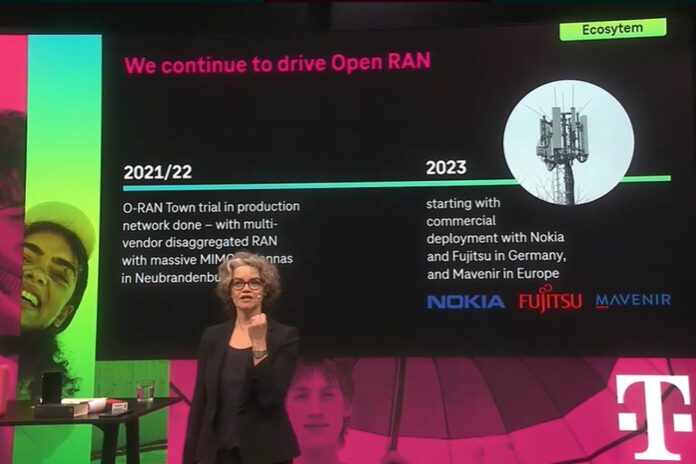If positive thinking were enough to overcome open RAN challenges, Claudia Nemat could solve a lot of problems
In her characteristically vivacious style, Claudia Nemat (pictured in full flow), Board Member for Technology and Innovation at Deutsche Telekom (DT), was emphatic about DT’s commitment to open RAN. She was speaking at her keynote address on the German operator’s stage here at Mobile World Congress.
“We believe in open RAN. We are committed to open RAN. And we will make sure it will reach the same level of performance that we need,” she said.
The operator announced that it will roll out commercial open RAN networks this year and revealed some of the vendor that will be involved in the deployment. In Germany, DT has selected Nokia and Fujitsu, and for its European markets, it has chosen Mavenir.
Short on detail
But scant details were provided beyond that. When questioned about the size of the commercial rollout during the Q&A, Nemat was coy, saying only that it would be “big enough to allow scale.”
DT has been running a multi-vendor 5G open RAN pilot in Neubrandenburg, which it calls O-RAN Town, since June 2021 with Mavenir, Dell, Intel, NEC, and Fujitsu.
DT described open RAN as the “technology of choice for future networks” and positioned the tech as a “catalyst to move Europe forward in the digital age together with partners.”
Earlier in the day, DT CEO Timotheus Höttges called out disaggregation and investing in software as key for modernising telco networks. He wants to “stop the black boxes” from existing suppliers in mobile and fixed networks not only to bring in competition from new vendors but also to lower costs and improve network operations efficiency.
“Disaggregation of the black boxes will help us use capex more efficiently,” said Höttges.
Wake up, Europe!
Höttges lambasted European industry for being stuck in its own “comfort zone,” and not doing enough to close the tech and digitalisation gaps with the US in particular, as well as Asia.
“Dependency is easy, sovereignty is not. We have to wake up and get out of our comfort zone on the European continent … When something is not working, don’t look out the window and ask other to fix it. Look in the mirror and ask what can I do to improve it?” he said.
As part of his plea for change, he touched on some familiar telco themes. He said that “economies of scale matter” and to facilitate that, there needs to be consolidation in European telco industry.
Höttges also added his voice to the fair share debate and said “impartial regulation” was needed. With six companies generating more than 60% of the traffic on our infrastructure, he asked, “Why can’t the hyperscalers, the streaming platforms, contribute at least a little bit to the effort and infrastructure that we’re building?”



